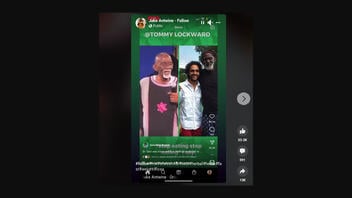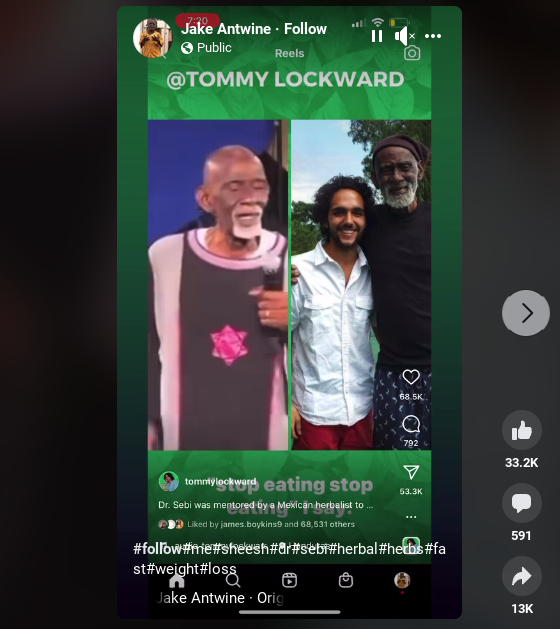
Will a 90-day diet of "herbs, water and juice" eliminate diabetes and impotence? No, that's not true: The assertion, made by "Dr. Sebi," a self-proclaimed healer and non-doctor whose health claims have been repeatedly debunked, is not backed by any credible evidence at the time of writing.
The claim appeared in a reel posted to Facebook on February 12, 2023. The reel featured a clip of Dr. Sebi, whose real name was Alfredo Bowman and who died in 2016 from pneumonia while jailed over money laundering charges. He was most widely known for his false claims of having cured AIDS and the belief that an "alkaline diet" would alkalinize the body and prevent toxicity that leads to disease. In the clip used in the reel, he was in front of a crowd telling a story of a miracle cure he was given by a person in Mexico. Sebi said in part:
This Mexican came and said to me, 'Stop eating. Stop eating!' I said 'How long, a day?' He said 'No, no, no, no: at least 90 days.' I said 'You out of your mind.' He said 'I may be out of my mind but I'm 94. But you are full of shit.' He gave me these herbs, I went home, I took them as prescribed. Herbs, water and juice; herbs, water and juice. But then, at the ending of 94 days, everything that I had before was gone: from diabetes, the impotence ...
This is what the post looked like on Facebook at the time of writing:
(Source: Facebook screenshot taken on Wed Mar 1 21:28:55 2023 UTC)
Lead Stories could not identify the source of the clip but did find additional footage of Sebi crediting a Mexican herbalist for helping him heal. The herbalist is identified as "Alfredo Cortez" in the description of the video and in other videos (here and here). This video contains an audio clip attributed to Sebi, who seemingly names an "Alfredo Cortez" as someone he researched.
While the incorporation and elimination of certain foods can help with the management of diabetes, there is no compelling evidence that a 90-day diet consisting only of "herbs, water and juice" will get rid of the chronic disease. The National Institute of Diabetes and Digestive and Kidney Diseases says an appropriate diet and physical activity plan for those living with diabetes will keep the patient's blood glucose level within a range suggested by the patient's health care team. The institute states:
The key to eating with diabetes is to eat a variety of healthy foods from all food groups, in the amounts your meal plan outlines.
Unlike the information in the anecdote Dr. Sebi shared, vegetables, fruits, grains, protein and dairy (nonfat or low-fat) options are all suggested by the institute.
On the other hand, the institute states that the following foods and drinks should be consumed minimally:
- fried foods and other foods high in saturated fat and trans fat
- foods high in salt, also called sodium
- sweets, such as baked goods, candy, and ice cream
- beverages with added sugars, such as juice, regular soda, and regular sports or energy drinks
The American Diabetes Association's publication "Standards of Care in Diabetes - 2023" includes a table describing medical nutrition therapy recommendations. Regarding "Micronutrients and herbal supplements," the publication states in part:
There is no clear evidence that dietary supplementation with vitamins, minerals (such as chromium and vitamin D), herbs, or spices (such as cinnamon or aloe vera) can improve outcomes in people with diabetes who do not have underlying deficiencies, and they are not generally recommended for glycemic control ... There may be evidence of harm for certain individuals with β carotene supplementation.
This recommendation is supported by evidence from studies of varying control levels. However, such sentiments are also echoed by the National Center for Complementary and Integrative Health, which notes that "We don't have reliable evidence that any herbal supplements can help to control diabetes or its complications."
Similarly, researchers have not found evidence that a 90-day diet of "herbs, water and juice" will stop any complications related to impotence, more formally known as erectile dysfunction. The National Center for Complementary and Integrative Health reports:
No complementary health approaches have been shown to be safe and effective for sexual enhancement or treating ED. Safety is a serious concern with regard to dietary supplements promoted for ED or sexual enhancement.
Researchers have studied a variety of herbal remedies for ED, but the amount of research on each herb has been small, and much of the research has been done in animals rather than people. Currently, there is no definite evidence that any herbal products are effective or safe for ED.
Katy Danielson, a media specialist for the National Center for Complementary and Integrative Health, told Lead Stories in an email sent on March 1, 2023:
NCCIH does not have any research to support this claim. We also do not recommend that people use alternative therapies to treat serious conditions for which there is ample research for existing conventional medical interventions.
Danielson also suggested this page from the center, which advises individuals interested in a complementary health approach on how to proceed.
Lead Stories also reached out to the American Diabetes Association, Mayo Clinic College of Medicine and Science and individual subject matter experts for more information about the claim. We will update this story as appropriate with any responses.
Claims by Dr. Sebi have been repeatedly debunked by Lead Stories. Those fact checks can be found here.


















